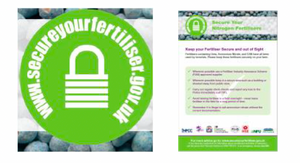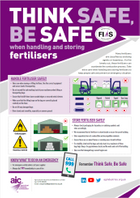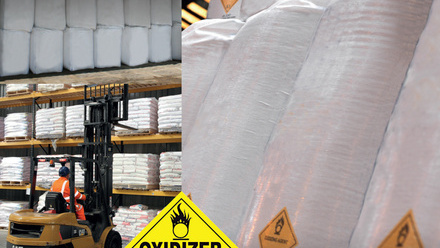Fertilisers – security and safety in current market conditions
Background
High global gas prices are affecting both the production of nitrogen fertilisers and pushing prices to new highs. Many farmers are facing some difficult decisions about crop feeding plans through winter and into next spring. Disruption to the fertiliser supply chain could well continue into spring 2022.
Fertiliser shortages and rising value of existing stocks on farm may increase the risk of theft. Some social media posts have been seen advertising fertiliser stock for sale with pictures of product and storage locations. Whilst these posts have usually been done to draw attention to the situation, it is not advised as such publicity may raise security risks and attract the attention of criminals.
Remember that nitrogen-based fertilisers can be used for illegitimate purposes. Anyone handling these products has a responsibility to provide secure storage and be vigilant.
How do I make best use of the available fertiliser?
Fertilising of crops is needed to maximise yield. Seek advice from FACTS qualified advisers to review all the options available taking into account each particular circumstance of the crop, soil type and environment.
I have too much fertiliser on farm for my needs how can I reduce stocks?
-
Should crop plans change, some farmers may no longer need existing stocks of nitrogen-based fertilisers held on their farm. Reselling the product is an option but this must be done in the right way - it is illegal to sell ammonium nitrate without the correct documentation.
- Fertilisers should not be advertised on auction sites, local trade magazines or social media. Contact the product supplier and arrange return and resale of the product by the supplier. If this is not possible, speak to other FIAS approved suppliers or your FACTS adviser.
What should I do if I see fertiliser for sale?
If offered a supply of ammonium nitrate or other nitrogen-based fertiliser:
- Do not purchase unless you know the source and have the correct documentation – this includes product details, traceability and detonation resistance information. Sellers should be FIAS approved. Check FIAS status here: https://www.agindustries.org.uk/sectors/trade-assurance-schemes.html
- Report any suspicious sales activity to the police (101)
- Check with your FACTS adviser if unsure
Stocks on farm have increased – how do I store safely?
Don’t forget the safe storage rules:
- Wherever possible use a Fertiliser Industry Assurance Scheme (FIAS) approved supplier
- Wherever possible keep in a secure area such as a building or sheeted, away from public view
- Carry out regular stock checks and report any loss to the police immediately (call 101)
- Avoid leaving fertiliser in a field overnight – never leave fertiliser in field for a long period of time.
- Remember it is illegal to sell ammonium nitrate without the correct documentation
More information:
1. The National Counter Terrorism Office (NaCTSO) 5 point plan for secure storage of fertilisers is available here:
Secure your fertiliser - GOV.UK (www.gov.uk)

2. FIAS: This scheme exists to prevent the misuse of fertilisers, ensure supply to legitimate businesses only and manage the UK fertiliser supply chain is managed at all stages regarding security, public safety and the environment. It covers the entire supply chain from sourcing, through to delivery of finished products to final user.
Information: www.agindustries.org.uk
Video: FIAS Guide to Storing Fertiliser: www.youtube.com/watch?v=O_uGt4TIVeg
AIC Fertiliser Safety leaflet: www.agindustries.org.uk/resource/aic-fertiliser-safety-leaflet-2021.html

FIAS Trade Assurance Checker: https://www.agindustries.org.uk/sectors/trade-assurance-schemes.html
Guidance from the HSE on the storage is available here.
A HSE check list to help ensure safe storage of AN fertiliser is available here.





